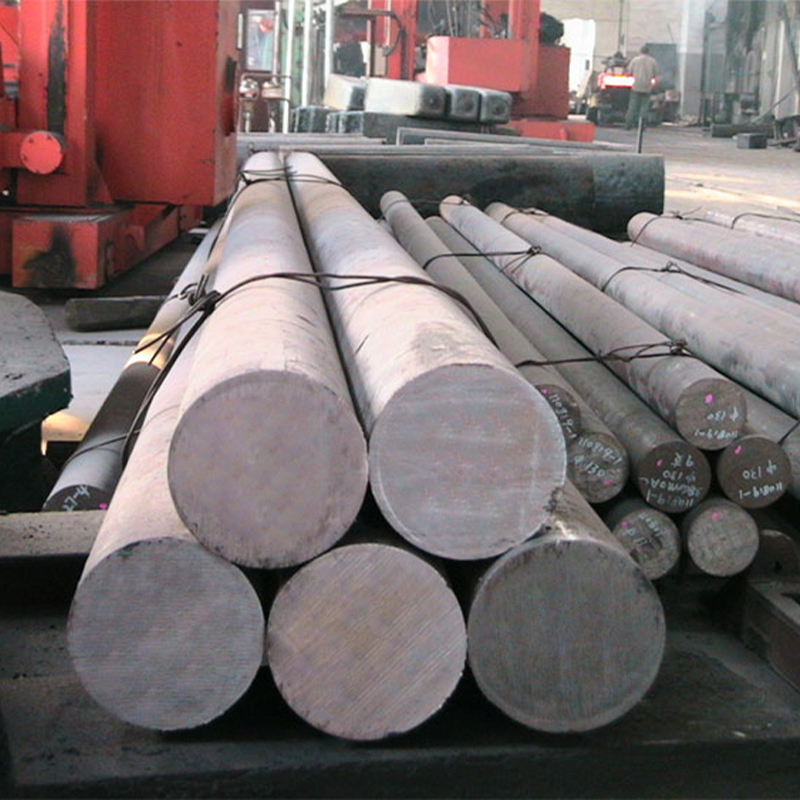
Nitriding offers several advantages compared to other surface hardening techniques for steel bars:
Increased Surface Hardness: Nitriding significantly increases the surface hardness of steel bars by diffusing nitrogen into the surface layer, creating a hard nitride compound zone. This hard layer, often reaching hardness levels of 1000-1200 HV, is primarily composed of iron nitrides such as gamma prime (γ'-Fe4N) and epsilon (ε-Fe2-3N) phases. The process enhances the steel's ability to withstand surface deformation and abrasive forces, making it ideal for components like gears and shafts that encounter high contact stresses.
Improved Wear Resistance: The nitrided layer provides exceptional wear resistance due to its high hardness and the formation of a compound zone that resists abrasion. This makes nitrided steel bars suitable for high-wear applications such as tooling, dies, and engine components. The improved wear resistance reduces material loss and the frequency of maintenance or replacements, thereby increasing the overall efficiency and lifespan of mechanical systems.
Enhanced Fatigue Strength: Nitriding enhances the fatigue strength of steel bars by introducing compressive residual stresses at the surface. These stresses counteract the tensile stresses that occur during cyclic loading, delaying the initiation and propagation of fatigue cracks. This is particularly beneficial for components like crankshafts, camshafts, and connecting rods, which undergo repetitive stress cycles. The increased fatigue strength results in longer-lasting and more reliable components, essential for critical applications in automotive and aerospace industries.
Superior Corrosion Resistance: The nitrided layer offers enhanced corrosion resistance due to the formation of a dense, hard nitride layer that acts as a barrier against corrosive agents. This is especially advantageous in high-temperature environments or when exposed to aggressive chemical environments, such as in the petrochemical industry. The improved corrosion resistance extends the service life of components, reduces maintenance costs, and ensures reliable performance under harsh conditions.
No Post-Heat Treatment Required: Nitriding typically does not require subsequent heat treatments to achieve the desired properties. This contrasts with other hardening processes, such as carburizing, which often necessitate additional heat treatment steps to refine the microstructure and attain the final hardness. Eliminating post-heat treatment steps reduces processing time and costs, streamlining production and improving efficiency.
Case Depth Control: Nitriding allows for precise control over the depth of the hardened layer, which can be adjusted based on the specific requirements of the application. The depth of the nitrided case can range from a few micrometers to several millimeters, depending on the process parameters and duration. This flexibility enables engineers to tailor the hardness profile to match the wear and load conditions of different components, ensuring optimal performance and longevity.
Reduced Friction: The nitriding process produces a smooth, hard surface that reduces the coefficient of friction between contacting parts. This reduction in friction leads to lower wear rates and improved efficiency in mechanical systems, such as engines and transmissions. Additionally, the smoother surface can help reduce noise and vibration in moving assemblies, contributing to quieter and more efficient operation.
Longer Service Life: The combination of increased surface hardness, improved wear resistance, enhanced fatigue strength, and superior corrosion resistance contributes to a significantly longer service life for nitrided components. This extended service life translates to lower replacement costs, reduced downtime, and higher reliability in critical applications. Industries such as automotive, aerospace, and manufacturing benefit from the enhanced durability and performance of nitrided steel bars.




 English
English русский
русский Español
Español عربى
عربى



